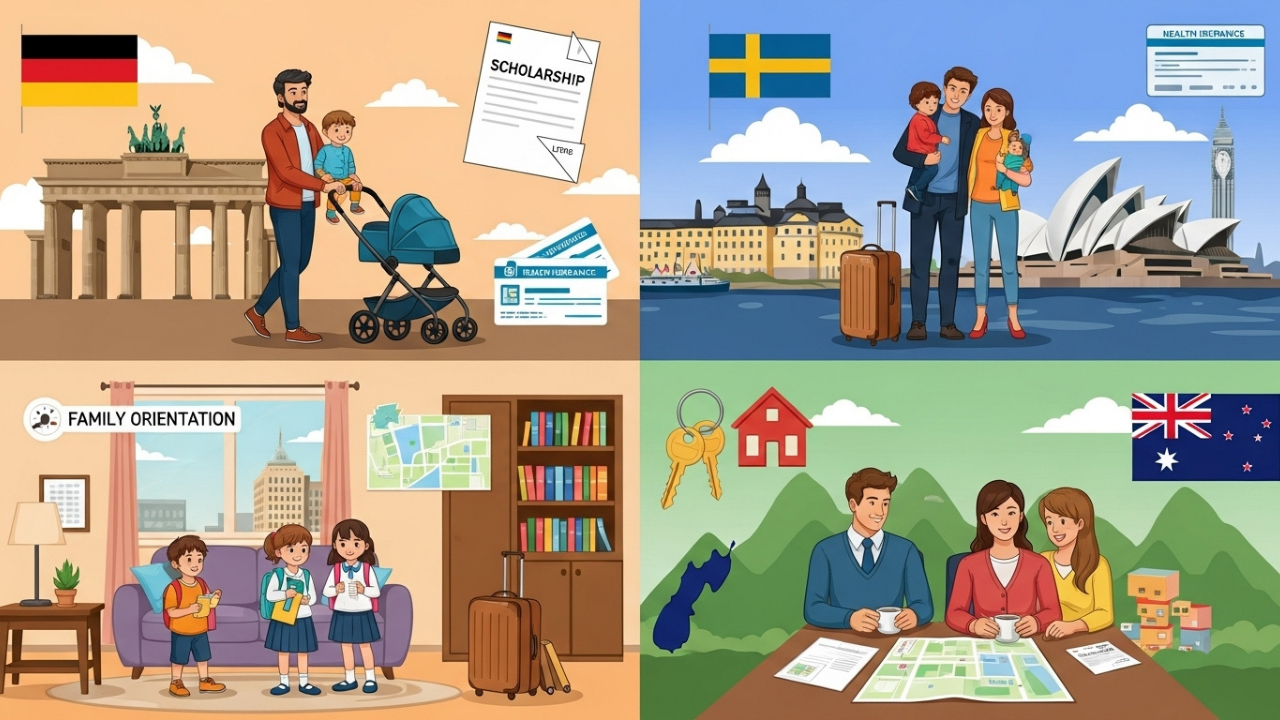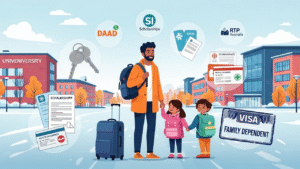The dream to study abroad is something that many students and researchers will face in the world, with only one giant concern that follows their heads when they think of studying abroad, and that is the family issue: What about my family?
It is the kind of question that should have a practical answer to—because a few years spent on getting the degree at the expense of leaving a spouse, children to live, or even elderly parents is a big sacrifice.
Many people would not figure out that certain government-funded scholarships are made keeping families in mind. Yes still — there are such. And yes, they are able to make your dream not only possible, but sustainable.
Depending on what doctorate degree you want to attempt, how far you want to go with a master’s program, or the length of a fellowship that you seek, there are programs that are not limited to tuition and personal allowances. Those programs will have family or reliant benefits to assist with paying a place to live, travel, childcare and day-to-day living expenses—so that you can be able to study in focus as you know family or reliant are with you and handled.
Know What Family Allowance Is All About
A family allowance in the scholarship world is simply monies given to your spouse and/or children when you are on a painfully funded program. This does not count as your own stipend and is normally an aspect of a long-term scholarship or fellowship supported by the government.
The support that is offered by the family can be in any form:
-
Payment of a child or a spouse monthly
-
Family accommodation / housing subsidy
-
Travel expense on dependents
-
Medical support or medical insurance
-
Family visa sponsorship and assistance
-
Family legal assistance
-
Support of childcare, in certain demographical areas or colleges
It is no charity. It’s investment. Governments and host institutions know that when they take responsibility not only to cover the books and the fees of a specific scholar, but also to cover the entire life of the scholar, the outcomes are pronounced, durable and significant.
Whom Are These Scholarships Supposed to Benefit?
Family-inclusive scholarships do not suit all the applicants but are oriented expressly to those students who:
-
Are married or in a recognised domestic partnership
-
Have legal dependents (children including adopted children)
-
Are doing graduate-level studies or research-based education
-
Are to live overseas—in a 12 months or more capacity
-
Are able to show responsibility, planning, and mission in taking care of dependents
At that, you do not have to be a parent and in your 30s. A lot of individuals do get married or have a family, especially in such countries where child-bearing at an early age is the trend in the early or mid-20s. In case this is your case, you are not disqualified but rather the group of people that some of these programs are designed to serve.
What Are Common Document Requirements?
In order to apply to a scholarship that presupposes family allowance, you can be required:
-
Certificate of marriage or other equivalent demonstration of alliance
-
Statement of partnership or other equivalent statement of alliance
-
Children’s birth certificates (in case of child allowance request)
-
Evidence of custody (in case separated or a widow)
-
Letters giving details about your family condition and the reason why support and help is required
-
Documentation of each dependent in terms of visa
-
Sometimes the plans are regarding housing or schooling of children in reference to the program
Such things take time so it is better to have these papers ready well in advance—particularly when sending these documents overseas, translating them into the host country’s language, or getting them certified.
What Does the Family Allowance Normally Aim At?
The typical elements of family support that could be available through a government-sponsored scholarship should be deconstructed:
Marriage Allowance / Monthly Payments to the Spouse or Children
This is the most prevalent advantage. Scholarships are usually either fixed or a monthly pay to assist in living costs of the spouse or child.
For example:
-
DAAD (Germany): Up to a set amount per month may be awarded to a spouse. €200–€300 per child per month may also be provided.
-
SI Scholarships (Sweden): These may indirectly support dependents through cost-of-living subsidies.
-
RTP Programs (Australia): Regularly give students an opportunity to claim relocation allowance—including that of dependents.
Family Accommodation or Housing Support
Part of the programs offer a housing subsidy or the possibility to stay in family dorms or university apartments each month.
This is very helpful in urban areas where rent is high and student accommodation is usually designed for single occupancy. Having assistance in housing can be the difference between bringing your family or leaving them behind.
Moving and Travelling Expenses
Some long-term research fellowships or PhD programs offer support for family travel at the beginning and end of the program.
This may consist of:
-
One-way or round-trip flight tickets for spouse or children
-
Meeting you at the airport and boarding everyone together
-
Covered visa costs or residence permits for dependents
Schooling and Childcare (in Certain Countries)
Though rarer, some scholarship programs or university affiliations provide:
-
Access to government-funded daycare or preschool
-
Help with registration in local district schools
-
Integration-focused counseling and support for the whole family
This is most commonly found in Sweden, Germany, or New Zealand—countries where social integration and education is part of national policy.
Dependent Health Insurance
If your host country requires mandatory health coverage, most government scholarships will fall under one of two categories:
-
Group insurance coverage for family members
-
A monthly allowance for you to purchase private insurance for dependents
Always double-check what’s covered: Does it include dental, emergency, maternity care, and so on?
Examples of Family Benefit Government-Funded Scholarships
To see some real, current programs that offer this type of support, let us look at a few of them:
DAAD Scholarships (Germany)
-
Open to students seeking a Master, PhD, and Postdoctoral degree
-
Provides family allowance in the form of a monthly amount
-
Travel and relocation grants available
-
Family housing subsidies
-
Most of the time includes totally free or subsidized healthcare
In-depth academic life—the DAAD has a reputation of supporting it, and they realize that to a lot of students, academic success is highly correlated to family stability.
Swedish Institute Scholarships
-
In case of your scholarship, family members can be provided with residence permits to remain there
-
Scarcity of childcare facilities in certain places
-
Despite the missing aspect of scholarships paying allowances, families are well supported in Sweden due to its policies which extend to social aspects
Australian Government RTP (Research Training Program)
-
Includes relocation allowance for dependents
-
Endorsement of dependent visas
-
Spouses and children may be eligible for public health insurance (Medicare)
-
Some universities provide family dorms or rent aid
New Zealand Government Scholarship
-
Dependents are allowed to accompany the scholar using a long-stay visa
-
Some grants provide cost-of-living allowances to a family
-
Community integration and family-based counseling assistance available
What Would Be the Initial Step in a Family-Funded Scholarship?
Since you now understand that there are scholarships such as these—and now the way they could be used to help your spouse and children—time will come when you apply, but in the correct way.
In this segment of the guide, you will go through the very specific steps, find answers to frequently asked questions, and be ready for what your life may become after your family members join you in one of the new countries.
The process of making your family come with you as a student involves not only the completion of forms, but organizing your entire life abroad.
An Instructional Guide to Applying to a Family-Inclusive Government Scholarship
Step 1: Select the Best Scholarship and Host Nation
Not all government-funded scholarships have a family allowance. The first thing you have to do is locate those that do. Target countries and programs where:
-
Family visas are legally supported
-
Scholarships are long-term (more than 12 months)
-
The governments or host institutions have a structure for dependents
Countries that are possibly the best to start with:
-
Germany (DAAD)
-
Australia (RTP)
-
New Zealand (MFAT Scholarships)
-
Thailand (Thai Scholarship)
-
Finland (EDUFI program)
Once you have shortlisted a few programs, visit their official websites—not third-party blog sites. Look under key terms such as:
-
Dependent allowance
-
Family stipend
-
Relocation support
Step 2: Clear the Eligibility Step
Usually, to apply, you should meet the following:
-
Enrolment in a graduate think tank or doctorate school in full-time status
-
Dependents, marriage, birth certificates or other legal documentation
-
An extended study block that is worth family relocation (usually 12+ months)
-
Compliance with family reunification country-specific visa laws
In case of any uncertainty, write to the scholarship coordinator. Direct questions should be asked such as:
-
Will spouses and children be supported and financed through this program or does it offer a visa-sponsorship?
-
Does this scholarship have family housing options?
The planning will then be clear and constructive.
Step 3: Preparation of Your Application Materials
The trick at this point is to show yourself not just as a scholar—but also a planner, parent, and partner. Your application ought to be detailed, systematic, and aligned with what the scholarship expects.
Standard Application Documents
-
Filled scholarship application form
-
Copies of all family members’ passport/ID
-
Admission letter of a university
-
Proposal of a research or study (at the graduate level)
Family-Specific Documentation
-
Marriage certificate (translated and notarized, if required)
-
Children’s birth certificates
-
Evidence of custody (in case divorced/separated)
-
Vaccines and health records (depends on country)
-
If applicable, a Financial Justification or Need Statement
This statement should:
-
Explain why you need family support in order to succeed
-
Describe your family structure and cost of living
-
Some scholarships may require an estimated monthly budget sheet
Step 4: Pen a Good Personal Statement as a Parent or Spouse
This is the point where most applicants hesitate. It should not compromise your story as a parent or partner—in fact, it should enhance it.
1. Recognize Your Family, Confidently
No excuses because you are married or have children. Demonstrate how it advances your educational aspirations.
Example:
The challenge that I as a mother confronted meant being torn between teaching and the role that a mother plays; this really helped me to learn about resilience, focus and purpose in life which I apply to my current PhD program in early childhood development.
2. Connect Your Family Situation to Your Goals
Your statement should reflect that your academic achievement is not just personal—it supports your family and gives back to your community.
Example:
Having my family by my side with me graduating this degree means that I can participate fully in my fieldwork without affecting the health of my child.
3. Be Able to Show Planning and Preparedness
Mention practical actions you’ve already taken. Planning shows initiative and seriousness.
Example:
I already made inquiries to the local schools in the university district and checked the availability to enter a preschool. My husband will tend to household chores and I will study.
Step 5: Early Submission and Follow-Up
Once submitted, stay proactive and organized:
-
Keep receipts of submission and save confirmation emails
-
If shortlisted, respond quickly to any request for additional documents
-
Once accepted, inquire about housing, visa schedule, and family integration services
What Then Comes to Pass When You Are Accepted?
The first victory is attaining the scholarship. Now it’s time to prepare for the practical move—bringing your family along.
Obtaining Visa for Your Dependents
Every country has different rules, but commonly required documents include:
-
Proof of scholarship and university enrolment
-
Legal documents showing family relations (marriage certificate, birth certificates)
-
Evidence of family housing
-
Health insurance coverage
-
Complete visa applications for each dependent
You may be required to apply for dependent visas at the same time as your own student visa—not later.
Accommodation Arrangement for the Entire Family
Start early. Some universities provide:
-
Family dormitories
-
University-owned apartments
-
Private married student housing
Ask your scholarship sponsor whether you’re eligible for a housing stipend or if they can assist in booking family-friendly accommodations.
Note: Family units in most large cities often have waiting lists, so plan well in advance.
Schooling and Child Care
If your child is of school age, be sure to research the following in advance:
-
Procedures of local public school enrollment
-
Availability of other curricula (e.g., international curriculum or language support)
-
Start dates, required immunizations, and documentation needed (e.g., proof of vaccination)
For younger children, consider:
-
Daycare or pre-school alternatives
-
Subsidized childcare programs
-
On-site childcare (provided by some universities for student parents)
Insurance and Health Care
In the majority of scholarship programs:
-
The primary student is insured automatically
-
Dependents may be either:
-
Added to the same plan, or
-
Required to register separately
-
Pay close attention to the limits of coverage. Ask yourself:
-
Is maternity care included?
-
Are dental services covered?
-
Are emergencies repaid?
Always read the fine print and, if needed, request a translated copy of local policy documents in English.
Universal Problems (and the Solutions)
There is no doubt that being a student abroad together with the family is a gift—but also a heavy responsibility. Below are some of the most common problems and smart, actionable solutions:
Problem: Housing is Not Affordable or Not Available
Solution:
-
Apply early via university housing offices
-
Join Facebook groups or forums for international students and families in the city
-
Request an increased housing allowance, if permitted by the program
Problem: Feeling Lonely or Lack of Purpose for the Spouse
Solution:
-
Explore neighborhood community centers or expat groups
-
Encourage part-time volunteering, language classes, or short training courses
-
In countries like Canada or Australia, inquire about spousal work permits
Obstacle: There Is Little or No Childcare, and Long Queues
✅ Solution:
-
Sign up as soon as possible, even before your arrival
-
Look for childcare services on campus
-
It may even be a good idea to share child-raising duties with another student-parent
Challenge: Family Status Was a Reason for Application Rejection
✅ Solution:
-
Request feedback from the scholarship provider (if possible)
-
Reapply the following year with stronger documentation
-
In some cases, it is wise to apply on your own first and then bring your family after you’ve settled in
True Story: How Amal Came With Her Two Children to Sweden After Leaving Egypt
Amal is an Egyptian social science scholar who won the Swedish Institute Scholarship for Global Professionals. She was a mother of young children and was unsure at first whether she could move with them.
She contacted the scholarship office, and they informed her that she was eligible to apply for a family residence permit. Her spouse came as a dependent and stayed at home with the kids while she attended university full time.
Though the scholarship didn’t provide direct child allowances, it covered housing, health insurance, and a personal stipend—which helped cover childcare costs.
Amal proceeded to complete her degree with distinction and was later awarded a second grant to study child policy.
She shares:
“I would not have applied in case I believed that my children were obligated to remain behind. Being able to bring them made me strong enough to achieve.”
My Opinion|You Need Not Pit Family Against Education
A family should no longer stop the education process—a family should become part of this process.
This is becoming increasingly visible as government-provided scholarships extend assistance to students with dependents. With careful planning, sincere communication, and solid documentation, you can pursue your degree without leaving your loved ones behind.
Of course, there will be difficulties. But there will also be growth, discovery, and unforgettable milestones—not just for you, but for everyone who walks this journey with you.








